Thomas Aquinas in Translation (8 vols.)
Digital Verbum Edition
Overview
Study the works of arguably the most brilliant mind in Christianity, Thomas Aquinas. The Aquinas in Translation series presents—for the first time in English—several of Aquinas’ most significant (yet surprisingly understudied) works. Several volumes are also accompanied by the best Latin critical editions for unparalleled access to the thought of the Angelic Doctor of the Church.
This incredible collection includes the three-volume commentary on the Gospel of John, into which Aquinas poured his theological, pastoral, and exegetical genius, as well as his incredibly deep knowledge of the writings and commentaries from such Church Fathers as Agustine, Origen, and Chrysostom. Also included are Aquinas’ exposition and commentary on several of history’s most influential works of philosophy and theology, from Aristotle, Boethius, and Peter Lombard. In the most recent volume of the series, On Creation [Quaestiones Disputatae de Potentia Dei, Q. 3], Aquinas exhibits his intellectual prowess and offers timely insight today’s Church on such perennial issues as divine and human freedom, whether or not the world is created, the problem of evil, and the status of the developing human embryo.
In the Logos editions, these valuable volumes are enhanced with amazing functionality and features. Scripture and ancient-text citations link directly to English translations and original-language texts, and important terms link to dictionaries, encyclopedias, and a wealth of other resources in your digital library. Perform powerful searches with the Topic Guide to instantly gather relevant biblical texts and resources, enabling you to jump into the conversation with the foremost scholars in systematic theology. Tablet and mobile apps let you take the discussion with you. With Logos Bible Software, the most efficient and comprehensive research tools are in one place so you get the most out of your study.
For more works from Aquinas, to check out these other amazing resources.
Key Features
- The first English translations of several important texts
- Helpful introductions and notes
- The best critical texts of several of Aquinas’ works
- Indexes of, and cross-references between, Aquinas’ writings and other primary texts
Individual Titles
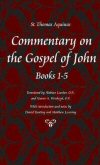
Commentary on the Gospel of John: Chapters 1–5
- Author: Thomas Aquinas
- Editors: Daniel Keating and Matthew Levering
- Translators: Fabian Larcher and James Weisheipl
- Series: Thomas Aquinas in Translation
- Publisher: Catholic University of America
- Publication Date: 2010
- Pages: 313
Thomas Aquinas possessed excellent knowledge of the commentaries of Origen, John Chrysostom, and Augustine. On the basis of this foundation, he produced his own commentary on the Gospel of John as part of his task as a Master of the Sacred Page. Considered a landmark theological introduction to the Fourth Gospel, these lectures were delivered to Dominican friars when Aquinas was at the height of his theological powers, when he was also composing the Summa Theologiae. For numerous reasons, the Summa has received far more attention over the centuries than has his Commentary on the Gospel of John. However, scholars today recognize Aquinas’ biblical commentaries as central sources for understanding his theological vision and for appreciating the scope of his Summa Theologiae.
The first English translation of Aquinas’ Commentary on the Gospel of John by Fabian Larcher and James Weisheipl, now long out of print, is available to scholars and students once again with this edition. Published in three volumes simultaneously, it includes a new introduction and notes pointing readers to the links between Aquinas’ biblical commentary and his Summa Theologiae. When a verse from the Gospel of John is directly quoted in the Summa Theologiae, the editors note this in the commentary. Aquinas’ patristic sources, including Origen and Augustine, are carefully identified and referenced to the Patrologia Latina and Patrologia Graeca. The commentary’s connections with Aquinas’ Catena Aurea are also identified. This volume contains Aquinas’ commentary on the first five chapters of John’s Gospel.
While the most significant aspect of the publication is Aquinas’ text itself, the introduction and notes provide excellent aides to the reader and enrich the text. Daniel Keating and Matthew Levering contribute a clear and helpful introduction to the translation, providing brief but very useful explanatory notes about early writers and controversies.
—David M. Gallagher, consulting scholar at the James Madison Program, Princeton University
Daniel Keating is associate professor of theology at Sacred Heart Major Seminary. Some of his edited and authored works include Aquinas on Doctrine: A Critical Introduction, The Theology of St. Cyril of Alexandria, Catholic Commentary on Sacred Scripture: First and Second Peter, Jude, and several other volumes.
Matthew Levering is professor of theology at the University of Dayton and is the author or editor of several books, including Brazos Theological Commentary on the Bible: Ezra & Nehemiah.
Fabian Larcher (1914–1991) was an ordained priest in the Roman Catholic Church who taught mathematics, philosophy, and theology at various schools and universities throughout the United States.
James Weisheipl (1923–1984) was ordained to the priesthood of the Roman Catholic Church in 1949. He earned his doctorate in philosophy from the University of Saint Thomas Aquinas in Rome and his doctorate in history from Oxford. He taught for many years on the Pontifical Faculty of Philosophy in River Forest, Illinois.
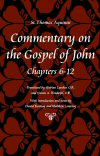
Commentary on the Gospel of John: Chapters 6–12
- Author: Thomas Aquinas
- Editors: Daniel Keating and Matthew Levering
- Translators: Fabian Larcher and James Weisheipl
- Series: Thomas Aquinas in Translation
- Publisher: Catholic University of America
- Publication Date: 2010
- Pages: 312
Thomas Aquinas possessed excellent knowledge of the commentaries of Origen, John Chrysostom, and Augustine. On the basis of this foundation, he produced his own commentary on the Gospel of John as part of his task as a Master of the Sacred Page. Considered a landmark theological introduction to the Fourth Gospel, these lectures were delivered to Dominican friars when Aquinas was at the height of his theological powers, when he was also composing the Summa Theologiae. For numerous reasons, the Summa has received far more attention over the centuries than has his Commentary on the Gospel of John. However, scholars today recognize Aquinas’ biblical commentaries as central sources for understanding his theological vision and for appreciating the scope of his Summa Theologiae.
The first English translation of Aquinas’ Commentary on the Gospel of John by Fabian Larcher and James Weisheipl, now long out of print, is available to scholars and students once again with this edition. Published in three volumes simultaneously, it includes a new introduction and notes pointing readers to the links between Aquinas’ biblical commentary and his Summa Theologiae. When a verse from the Gospel of John is directly quoted in the Summa Theologiae, the editors note this in the commentary. Aquinas’ patristic sources, including Origen and Augustine, are carefully identified and referenced to the Patriologia Latina and Patrologia Graeca. The commentary’s connections with Aquinas’ Catena Aurea are also identified. This volume contains Aquinas’ commentary on chapters 6–12 of John’s Gospel.
While the most significant aspect of the publication is Aquinas’ text itself, the introduction and notes provide excellent aides to the reader and enrich the text. Daniel Keating and Matthew Levering contribute a clear and helpful introduction to the translation, providing brief but very useful explanatory notes about early writers and controversies.
—David M. Gallagher, consulting scholar at the James Madison Program, Princeton University
Daniel Keating is associate professor of theology at Sacred Heart Major Seminary. Some of his edited and authored works include Aquinas on Doctrine: A Critical Introduction, The Theology of St. Cyril of Alexandria, Catholic Commentary on Sacred Scripture: First and Second Peter, Jude, and several other volumes.
Matthew Levering is professor of theology at the University of Dayton and is the author or editor of several books, including Brazos Theological Commentary on the Bible: Ezra & Nehemiah.
Fabian Larcher (1914–1991) was an ordained priest in the Roman Catholic Church who taught mathematics, philosophy, and theology at various schools and universities throughout the United States.
James Weisheipl (1923–1984) was ordained to the priesthood of the Roman Catholic Church in 1949. He earned his doctorate in philosophy from the University of Saint Thomas Aquinas in Rome and his doctorate in history from Oxford. He taught for many years on the Pontifical Faculty of Philosophy in River Forest, Illinois.
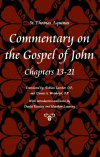
Commentary on the Gospel of John: Chapters 13–21
- Author: Thomas Aquinas
- Editors: Daniel Keating and Matthew Levering
- Translators: Fabian Larcher and James Weisheipl
- Series: Thomas Aquinas in Translation
- Publisher: Catholic University of America
- Publication Date: 2010
- Pages: 318
Thomas Aquinas possessed excellent knowledge of the commentaries of Origen, John Chrysostom, and Augustine. On the basis of this foundation, he produced his own commentary on the Gospel of John as part of his task as a Master of the Sacred Page. Considered a landmark theological introduction to the Fourth Gospel, these lectures were delivered to Dominican friars when Aquinas was at the height of his theological powers, when he was also composing the Summa Theologiae. For numerous reasons, the Summa has received far more attention over the centuries than has his Commentary on the Gospel of John. However, scholars today recognize Aquinas’ biblical commentaries as central sources for understanding his theological vision and for appreciating the scope of his Summa Theologiae.
The first English translation of Aquinas’ Commentary on the Gospel of John by Fabian Larcher and James Weisheipl, now long out of print, is available to scholars and students once again with this edition. Published in three volumes simultaneously, it includes a new introduction and notes pointing readers to the links between Aquinas’ biblical commentary and his Summa Theologiae. When a verse from the Gospel of John is directly quoted in the Summa Theologiae, the editors note this in the commentary. Aquinas’ patristic sources, including Origen and Augustine, are carefully identified and referenced to the Patriologia Latina and Patrologia Graeca. The commentary’s connections with Aquinas’ Catena Aurea are also identified. This volume contains Aquinas’ commentary on chapters 13–21 of John’s Gospel.
While the most significant aspect of the publication is Aquinas’ text itself, the introduction and notes provide excellent aides to the reader and enrich the text. Daniel Keating and Matthew Levering contribute a clear and helpful introduction to the translation, providing brief but very useful explanatory notes about early writers and controversies.
—David M. Gallagher, consulting scholar at the James Madison Program, Princeton University
Daniel Keating is associate professor of theology at Sacred Heart Major Seminary. Some of his edited and authored works include Aquinas on Doctrine: A Critical Introduction, The Theology of St. Cyril of Alexandria, Catholic Commentary on Sacred Scripture: First and Second Peter, Jude, and several other volumes.
Matthew Levering is professor of theology at the University of Dayton and is the author or editor of several books, including Brazos Theological Commentary on the Bible: Ezra & Nehemiah.
Fabian Larcher (1914–1991) was an ordained priest in the Roman Catholic Church who taught mathematics, philosophy, and theology at various schools and universities throughout the United States.
James Weisheipl (1923–1984) was ordained to the priesthood of the Roman Catholic Church in 1949. He earned his doctorate in philosophy from the University of Saint Thomas Aquinas in Rome and his doctorate in history from Oxford. He taught for many years on the Pontifical Faculty of Philosophy in River Forest, Illinois.
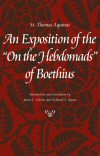
In his sixth-century work commonly known as the De Hebdomadibus, Boethius (ca. 480–524) poses the question of how created things or substances can be good just as they are—that is, good just by existing—without being the same as the source of all goodness, God, who is understood to be Goodness Itself. In his commentary written in the thirteenth century, St. Thomas Aquinas sets out to explain the problem Boethius is treating as well as to explicate Boethius’ solution. In doing so, however, the Angelic Doctor suggests a more developed analysis of goodness, based on his own metaphysical perspective.
The introduction to this translation provides critical historical background, including an account of the influence of Cicero and Augustine, for understanding Boethius’ view of being, or esse. Based on historical and textual analysis, the authors reaffirm the “traditional” interpretation, which holds that, for Boethius, esse indicates form rather than a distinct act of being. In articulating the difference between Boethius’ and Aquinas’ positions on esse and goodness, and hence the relation of esse and goodness, Schultz and Synan show not only that Aquinas was respectful of Boethius’ stance, but that his own position could be seen as a development in harmony with his predecessor’s thought.
This edition presents the English translation with the 1992 Leonine critical edition of Aquinas’ Latin text for easy comparison. The work will be valuable to those interested in the fundamental philosophical and theological questions facing mediaeval thinkers and Aquinas’ metaphysical thought in particular.
What emerges from this fascinating book is an account by the last Roman of goodness and existence, an active interpretation of that work by the Angelic Doctor, and a helpful introductory essay, in which the translators discuss the mechanics of Thomas’ reinterpretation. Consequently, this volume will be important for people with a rather large range of interests—metaphysics, late ancient philosophy, hermeneutics . . . The book is an outstanding piece of work.
—The Heythrop Journal
Janice L. Schultz is professor of philosophy at Canisius College and the author of numerous articles on Thomistic ethical theory.
Edward A. Synan (1918–1997) was senior fellow emeritus at the Pontifical Institute of Mediaeval Studies in Toronto and professor emeritus of philosophy at the University of Toronto. He was the author of eight books and many articles and reviews on mediaeval thought as well as Jewish-Christian relations.
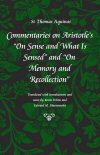
Commentaries on Aristotle’s “On Sense and What Is Sensed” and “On Memory and Recollection”
- Author: Thomas Aquinas
- Translators: Kevin White and Edward Macierowski
- Series: Thomas Aquinas in Translation
- Publisher: Catholic University of America
- Publication Date: 2005
- Pages: 268
In traditional catalogues of Aristotle’s works, On Sense and What Is Sensed and On Memory and Recollection are the immediate sequels to his On the Soul, and the first two books of his so-called Parva Naturalia, or “little works in natural philosophy.” In keeping with this order, Thomas Aquinas began his series of Aristotelian commentaries with a commentary on On the Soul, which he followed with commentaries on On Sense and What Is Sensed and On Memory and Recollection, written in 1268–1270. Until now, these latter two commentaries have never been published in English translation. The translations presented in this volume are based on the critical Leonine edition of the commentaries, which includes the Latin translations of the Aristotelian texts on which Aquinas commented. The volume includes English translations of these Latin translations, allowing the reader to compare Aristotelian text and Thomistic commentary in detail. The translations of both commentaries are furnished with introductions and notes by the translators.
This volume does the great service of making Aquinas’ commentaries on these two short works available in English for the first time. This volume makes a serious and worthwhile contribution to the study of Aquinas, Aristotle, and the tradition to which they both belong.
—Arthur Madigan, former chair of philosophy, University of Munich
The translations are clear and literate . . . [of] immediate interest to specialists in medieval philosophy and Thomists, especially in so far as it helps to clarify questions of psychology and epistemology in Aquinas’ thinking about the soul (anima).
—The Classical Outlook
Kevin White is associate professor of philosophy at the Catholic University of America.
Edward M. Macierowski is associate professor of philosophy and classical languages at Benedictine College.
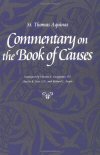
The Book of Causes, highly influential in the medieval university, was commonly, but incorrectly, understood to be the completion of Aristotle’s metaphysics. It was Thomas Aquinas who first judged it to have been abstracted from Proclus’ Elements of Theology, presumably by an unknown Arabic author, who added to it ideas of his own.
The Book of Causes is of particular interest because themes that appear in it are echoed in the metaphysics of Aquinas: its treatment of being (esse) as proceeding from the First Creating Cause; the triadic scheme of being, living, and knowing; and the general scheme of participation in which “all is in all.” Thus, the Book of Causes provides a historical backdrop for understanding and appreciating Aquinas’ development of these themes in his metaphysics.
Thomas’ Commentary on the Book of Causes, composed during the first half of 1272, is a distinct philosophical work in its own right. It provides an extended view of his approach to Neoplatonic thought and functions as a guide to his metaphysics. Though long neglected and, until now, never translated into English, it deserves an equal place alongside his commentaries on Aristotle and Boethius.
In addition to the extensive annotation, bibliography, and thorough introduction, this translation is accompanied by two valuable appendixes. The first provides a translation of another version of proposition 29 of the Book of Causes, which was not known to St. Thomas. The second lists citations of the Book of Causes found in the works of St. Thomas and cross-references these to a list showing the works, and the exact location within them, where the citations can be found.
Vincent A. Guagliardo (1944–1995) was ordained to the priesthood in the Roman Catholic Church in 1971. He received a PhD from the Graduate Theological Union and was chair and professor of philosophy at the Dominican School of Philosophy and Theology in Berkeley, California.
Charles R. Hess, OP, is an adjunct lecturer in ecclesiastical Latin at the Dominican School in Berkeley, California.
Richard C. Taylor is associate professor of philosophy at Marquette University. His area of specialty is ancient and medieval philosophy.
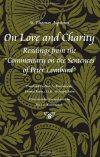
On Love and Charity: Readings from the Commentary on the Sentences of Peter Lombard
- Author: Thomas Aquinas
- Translators: Peter A. Kwasniewski, Thomas Bolin, and Joseph Bolin
- Series: Thomas Aquinas in Translation
- Publisher: Catholic University of America
- Publication Date: 2008
- Pages: 404
Among the great works of Thomas Aquinas, the Commentary on the Sentences of Peter Lombard has suffered almost total neglect among translators. Such neglect is surprising, considering that the massive commentary—more than 4,000 pages in the last printed edition—is not only Aquinas’ first systematic engagement with all the philosophical and theological topics on which he expended his energy over the span of a short career, but is also characterized by an exuberance and elaborateness seldom found in his subsequent writings. Although Chenu had already drawn attention decades ago to the importance of studying this youthful tour de force for a fuller understanding of Thomas’ more mature work, the Commentary on the Sentences has remained a closed book for many modern students of Thomistic and medieval thought because of its relative inaccessibility in English or in Latin.
The present volume, containing all the major texts on love and charity, makes available what is by far the most extensive translation ever to be made from the commentary with the added benefit that the better part of the translation is based on the (as yet unpublished) critical edition of the Leonine Commission. The collection of texts from all four books has a tight thematic coherence that makes it invaluable to students of Thomas’ moral philosophy, moral theology, and philosophical theology. In addition, the inclusion of parallel texts from Aquinas’ first (Parisian) commentary as well as from his second (Roman) attempt at a commentary, the recently rediscovered Lectura Romana, makes this edition all the more valuable for those who wish to track the internal development of Thomas’ thinking on these matters.
[T]he present volume contains by far the most extensive English translation from the Scriptum to date . . . The translators of On Love and Charity have aimed to give a translation which is neither too literal nor too liberal, trying to find the golden mean between an unintelligibly Latinized or an enjoyable but unfaithful English version . . . This impressive volume will be of a great help for those wishing to study Aquinas and the issue of love in more depth.
—Ephemerides Theologicae Lovanienses
Peter A. Kwasniewski is associate professor of philosophy and theology at Wyoming Catholic College and editor of Wisdom’s Apprentice: Thomistic Essays in Honor of Lawrence Dewan, O.P.
Thomas Bolin, OSB, is a monk at the Monastero di San Benedetto in Norcia, Italy and is pursuing doctoral studies at the University of the Holy Cross in Rome.
Joseph Bolin is adjunct professor of philosophy at the International Theological Institute in Gaming, Austria, and adjunct instructor of Latin for the Austrian Program of the Franciscan University of Steubenville.
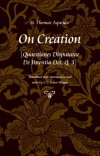
Thomas Aquinas wrote his Disputed Questions on the Power of God (Quaestiones Disputatae de Potentia Dei) in Rome in 1265–1266. Begun, though probably not completed, before he wrote the first part of his famous work, the Summa Theologiae, the de Potentia Dei considered 10 questions that evoked lively debate in Thomas’ day and continue to do so in our own.
This volume includes a new English translation of Question 3, in which Thomas takes up questions and ideas about divine and human freedom, whether or not the world is created, the problem of evil, the efficacy of creatures, and the status of the developing human embryo. It offers a comprehensive treatment of creation and the metaphysics and anthropology Thomas employs in considering the general creation of the universe and the particular creation of each human being.
Susan C. Selner-Wright’s translation of the critical Leonine edition is intended to make Thomas’ contribution to the current discussion more accessible. It constitutes a focused but extended example of Thomas at the height of his intellectual powers. We find him here in conversation with 50 different source works, engaged with the ideas of pagan, Christian, Islamic, and Jewish thought, and demonstrating his understanding of philosophy and theology as distinct but complementary disciplines. Throughout the text, Selner-Wright directs the reader to Thomas’ own sources, related texts elsewhere in Thomas’ corpus, and secondary sources. Philosophical notes give background for particular claims or arguments and trace important philosophical principles at work throughout the text.
Susan C. Selner-Wright is associate professor of philosophy at St. John Vianney Theological Seminary.
Product Details
- Title: Thomas Aquinas in Translation
- Publisher: Catholic University of America
- Volumes: 8
- Pages: 2,142
About Thomas Aquinas
Thomas Aquinas (1225–1274) entered the Benedictine abbey of Montecassino at the age of five to begin his studies. He was transferred to the University of Naples at age 16, where he became acquainted with the revival of Aristotle and the Order of the Dominicans. Aquinas went on to study in Cologne in 1244 and Paris in 1245. He then returned to Cologne in 1248, where he became a lecturer.
Aquinas’ career as a theologian took him all over Europe. In addition to regularly lecturing and teaching in cities throughout Europe, Aquinas participated regularly in public life and advised both kings and popes. Thomas Aquinas also profoundly influenced the history of Protestantism. He wrote prolifically on the relationship between faith and reason, as well as the theological and philosophical issues which defined the Reformation.
Thomas Aquinas is most well-known for his monumental works Summa Theologica and Summa contra Gentiles.
For more works from Aquinas, to check out these other amazing resources.
- The first English translations of several important texts
- Helpful introductions and notes
- The best critical texts of several of Aquinas’ works
- Indexes of, and cross-references between, Aquinas’ writings and other primary texts
- Title: Thomas Aquinas in Translation
- Publisher: Catholic University of America
- Volumes: 8
- Pages: 2,142
Thomas Aquinas (1225–1274) entered the Benedictine abbey of Montecassino at the age of five to begin his studies. He was transferred to the University of Naples at age 16, where he became acquainted with the revival of Aristotle and the Order of the Dominicans. Aquinas went on to study in Cologne in 1244 and Paris in 1245. He then returned to Cologne in 1248, where he became a lecturer.
Aquinas’ career as a theologian took him all over Europe. In addition to regularly lecturing and teaching in cities throughout Europe, Aquinas participated regularly in public life and advised both kings and popes. Thomas Aquinas also profoundly influenced the history of Protestantism. He wrote prolifically on the relationship between faith and reason, as well as the theological and philosophical issues which defined the Reformation.
Thomas Aquinas is most well-known for his monumental works Summa Theologica and Summa contra Gentiles.
Reviews
8 ratings

Ralph A. Abernethy III
9/7/2017

AP D
8/18/2016
Stephen Quam
6/2/2015

Larry Proffitt (I
5/2/2015

Charles Puskas
4/19/2015
Michael Maria Waldstein
4/6/2014

Kenny Rhodes
2/21/2014

Kent R Acheson, DBA, MBA
2/21/2014